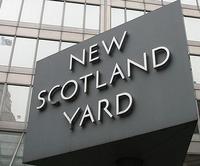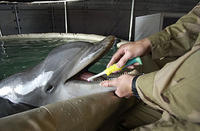-
Direct-mail list company adds emergency responder mailing lists
The growing attention to preparing for, coping with, and recovering from natural and man-made disasters means that more government and private funds are allocated to emergency services, and more professionals are trained and hired to perform emergency-related services; direct-mail companies have noticed this trend
-
-
Aussie emergency services industry continues to grow
Over the past five years, emergency services funding in Australia has been driven by population growth, which has led to an increase in demand for emergency services; emergency services industry will generate revenue of AUS$20.2 billion in 2011-12, an increase of 4.5 percent on the previous year
-
-
FAA moves on integrating drones into U.S. airspace

The Federal Aviation Administration (FAA) now allows a government public safety agency and first responders to operate drones weighing 4.4 pounds or less in the U.S. air space, but under certain restrictions: these drones should be used for training and performance evaluation, they must be flown within the line of sight of the operator, less than 400 feet above the ground, during daylight conditions, inside Class G (uncontrolled) airspace, and more than five miles from any airport or other location with aviation activities; the FAA says that if safety agencies then apply for a waiver, the agency will allow the operation of drones weighing up to twenty-five pounds
-
-
City of Seattle Fire Department improving firefighter, EMS responses
New communication system allows Seattle Fire Department to use new voice, video, and wireless by providing secure and fast switching between multiple networks
-
-
AT&T selected as TacCom prime vendor
AT&T Government Solutions has been selected as a prime vendor under the Tactical Communications Equipment and Services (TacCom) contract; the contract, administered by DHS, is a multiple award, Indefinite Delivery-Indefinite Quantity (IDIQ) contract with an overall value of $3 billion and a base contract period of two years and three, one-year options
-
-
Air-conditioned protective clothing for police, first responders, soldiers
Bullet-proof vests made of Kevlar; the material holds off bullets, but it also impenetrable to water vapor; police personnel who must wear such gear under their uniforms sweat profusely when the weather is warm; researchers develop a “smart,” air-conditioned protective vest, and the smart cooling technology is also suitable for protective suits worn over normal clothing, uniform jackets, camouflage suits
-
-
Las Vegas first responders testing next-generation LTE broadband
Public safety officers in Las Vegas, Nevada, are on the air with a 700 MHz Band 14 LTE (Long Term Evolution) solution through a pilot program that demonstrates the potential of next-generation wireless broadband technology
-
-
U.K. faces problem of security service members with links to terrorism

Abdul Rahman, a 33-year old Scotland Yard constable of Bangladeshi descent, had his security clearance revoked in 2006 — he chose to resign rather than be dismissed — following an MI5 investigation which concluded that, in 2001, he spent time in a terrorist training camp in Pakistan; he is one of three members of the U.K. security forces dismissed because of links to terrorism; this case made the headline because he is suing the service for compensation, and the secret legal proceedings are about to begin
-
-
FBI sting operations become more common

The FBI is using more and more informants in sting operations aiming to spot, and thwart, terrorist attacks in the United States; this use of informants and undercover agent by the FBI is being questioned by defense attorneys and civil liberties advocates, who ask whether such operations are preventing crimes that could have resulted in scores of deaths, or creating a crime that would not have occurred without the FBI’s help
-
-
Teaching robots to pick up oddly shaped objects
The use of robots in military and first response missions is growing; in some of these missions – for example, checking a suspicious object, lifting an oddly sahped IED off the floor — robots need more flexibility and dexterity than is currently available; researchers offer encouraging news on this front
-
-
U.S. Navy’s animal warriors enjoy the best of health care

The U.S. Navy is expanding the use of bottlenose dolphins and California sea lions to protect harbors from enemy swimmers, detect explosives on the seafloor, and perform other tasks such as guiding sailors through mine-laden waters or attaching recovery lines to lost equipment on the seafloor; the growing reliance on these mammals means that the Navy is also keeping a closer eye on their health
-
-
Protecting U.S. ships from Iranian speed-boat swarm attacks
In the event of a U.S. military attack on Iran’s nuclear facilities, the Iranians will adopt what the weaker side in a conflict typically does: engage in an asymmetric warfare; in the case of a naval clash, the Iranians are likely to use swarms of hundreds of small speed boats, equipped with anti-ship missiles and other weapons, to attack the much larger U.S. ships in the narrow confines of the Gulf; the U.S. Navy wants to use ray guns to deal with this threat
-
-
AT&T earns DHS disaster preparedness certification
AT&T receives the PS-Prep certification from DHS; PS-Prep (Voluntary Private Sector Preparedness Program), administered by FEMA, aims to enable private sector organizations to enhance their capabilities for planning, responding to, and recovering from natural disasters and other threats
-
-
Ohio University students develop 3-D maps to help first responders
A group of Ohio University students has created a 3-D building mapping program to help first responders in safely responding to emergencies ranging from fires to terrorist attacks
-
-
High-tech license plate readers effective, but raise ethical issues
The use of license-plate readers by police is growing, raising privacy concerns; cameras mounted atop the cruiser capture thousands of images a day; a computer inside the car checks the license plates against various crime databases, including wanted suspects, stolen vehicles, and sex offenders
-
More headlines
The long view
Why Was Pacific Northwest Home to So Many Serial Killers?
Ted Bundy, Gary Ridgway, George Russell, Israel Keyes, and Robert Lee Yates were serial killers who grew up in the Pacific Northwest in the shadow of smelters which spewed plumes of lead, arsenic, and cadmium into the air. As a young man, Charles Manson spent ten years at a nearby prison, where lead has seeped into the soil. The idea of a correlation between early exposure to lead and higher crime rates is not new. Fraser doesn’t explicitly support the lead-crime hypothesis, but in a nimble, haunting narrative, she argues that the connections between an unfettered pollution and violent crime warrant scrutiny.
Bookshelf: Smartphones Shape War in Hyperconnected World
The smartphone is helping to shape the conduct and representation of contemporary war. A new book argues that as an operative device, the smartphone is now “being used as a central weapon of war.”
